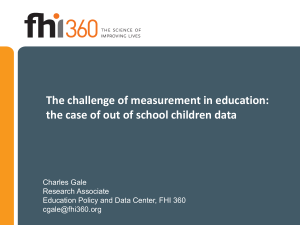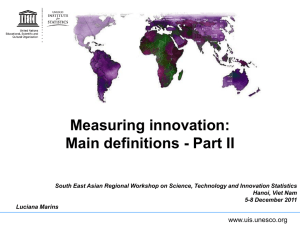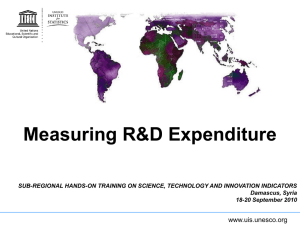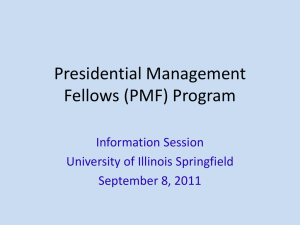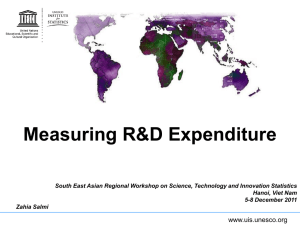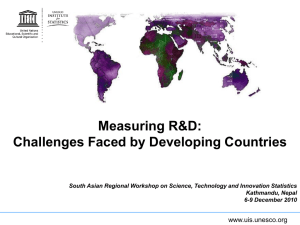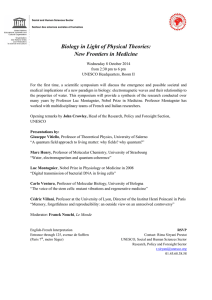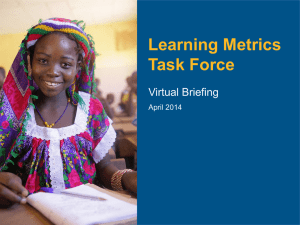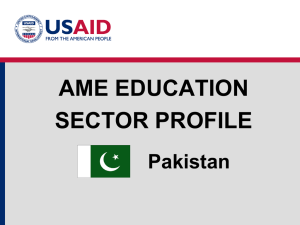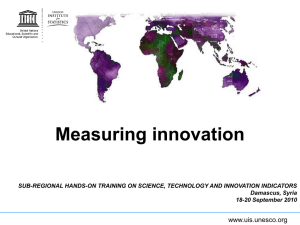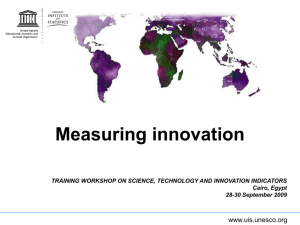Innovation surveys in developing countries
advertisement
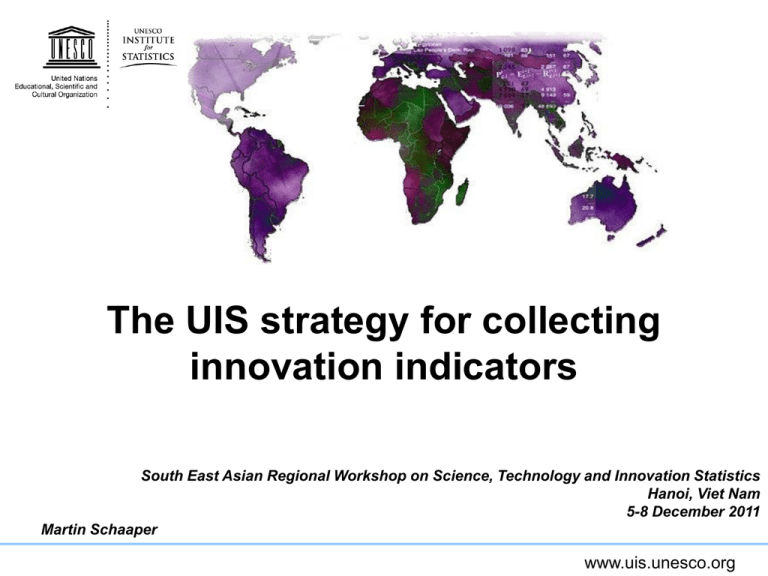
The UIS strategy for collecting innovation indicators South East Asian Regional Workshop on Science, Technology and Innovation Statistics Hanoi, Viet Nam 5-8 December 2011 Martin Schaaper www.uis.unesco.org The UIS STI innovation statistics strategy Capacity building & training activities; ; Methodological developments & survey help; UIS has a natural coordinating role as UN Inventory; lead agency on S&T statistics. Pilot data collection regular data collection every two years; Analysis & publication; Partnership with international/regional organisations (ASEAN, AU/NEPAD, Eurostat, OECD, RICYT…). www.uis.unesco.org 2 Innovation surveys in developing countries Inventory: • Innovation surveys in developing countries: questionnaires, methodological notes, publications; • Input for data collection; • Creation of a database; • Dissemination; • Work in progress; • Africa, Asia, LAC. www.uis.unesco.org 3 Innovation surveys in developing countries Africa: • 12 countries • 18 surveys Asia: • 12 countries • 26 surveys LAC: • 15 countries • 46 surveys Total: • 39 countries • 90 surveys *Europe (non-Eurostat): • Russia, Ukraine, Macedonia, Belarus www.uis.unesco.org 4 Innovation surveys in developing countries Number of countries Number of surveys carried out Number of surveys analysed Africa 12 (31%) 18 (20%) 13 (20%) Asia 12 (31%) 26 (29%) 15 (24%) LAC 15 (38%) 46 (51%) 36 (56%) Total 39 (100%) 90 (100%) 64 (100%) Region www.uis.unesco.org 5 Innovation surveys in developing countries: Asia Number of surveys carried out Number of surveys analysed Methodological base 1. Abu Dhabi* 1 1 OM/CIS 2. China 1 1 OM/CIS 3. Hong Kong* 2 0 OM 4. India 1 0 OM/CIS 5. Indonesia 1 1 OM/CIS 6. Israel 1 1 OM/CIS 7. Korea 6 1 OM/CIS 8. Malaysia 5 5 OM/CIS 9. Philippines 1 1 OM/CIS 10. Singapure 2 0 OM/CIS 11. Sri Lanka 1 1 OM/CIS 12. Thailand 4 3 OM/CIS 12 countries 26 15 - Asia www.uis.unesco.org 6 Innovation surveys in developing countries: Asia Observation period Asia - Observation period 2 1 2000 1 1 1990-94 1997-99 1 1 1999 2003 2 1 1 2 1 1 2000-01 2002-04 2004-06 2005-08 2005-09 2006-08 2009-10 www.uis.unesco.org 7 Innovation surveys in developing countries: Asia Cut-off point Asia - Size (cut-off point) 2 1 1 Emp* & Turn Emp5 & Turn 2 1 Turn Emp1 Emp10 1 1 Emp20 Emp5 www.uis.unesco.org 8 Innovation surveys in developing countries: Asia Industrial coverage Asia - Economic activities 9 6 0 Manuf Serv Manuf & Serv www.uis.unesco.org 9 Inventory - Most frequent questions Question Frequency Basic information 64 (100%) Product innovation 64 (100%) Process innovation 64 (100%) Engagement in innovation activ 62 (97%) Expenditure on innovation activ 59 (92%) Funding 59 (92%) Hampering factors 58 (91%) Sources of information 57 (89%) Co-operation 56 (88%) Organisational innovation 50 (78%) Marketing innovation 46 (72%) Effects of innovation 40 (63%) IPR 39 (61%) Objectives of innovation 33 (52%) www.uis.unesco.org 10 The UIS pilot innovation data collection Launch: June, 2011; Countries: 19 countries; Observation period: most recent innovation survey for which data are available; Topics: • Basic methodology (metadata) • Product innovation • Process innovation • Innovation activities and expenditures • Funding • Sources of information • Co-operation • Hampering factors • Organisational innovation • Marketing innovation www.uis.unesco.org 11 The UIS pilot innovation data collection Preliminary results - Manufacturing firms: Pilot - Percentage of innovators 70% 58% 60% 54% 51% 48% 50% 40% 34% 32% 31% 30% 31% 23% 27% 28% 20% 20% 14% 10% 12% 11% 5% 6% 8% 6% 0% Israel Brazil Colombia Product Process Organisational Egypt South Africa Marketing www.uis.unesco.org 12 Innovation surveys in developing countries Inventory - next steps: • Reorganise the regions; • Get the missing information; • Add new countries - developed world; • Disseminate the database; • Updating. Pilot - next steps: • More replies; • Data processing; • Data release. www.uis.unesco.org 13 Thank you! http://www.uis.unesco.org m.schaaper@unesco.org www.uis.unesco.org
